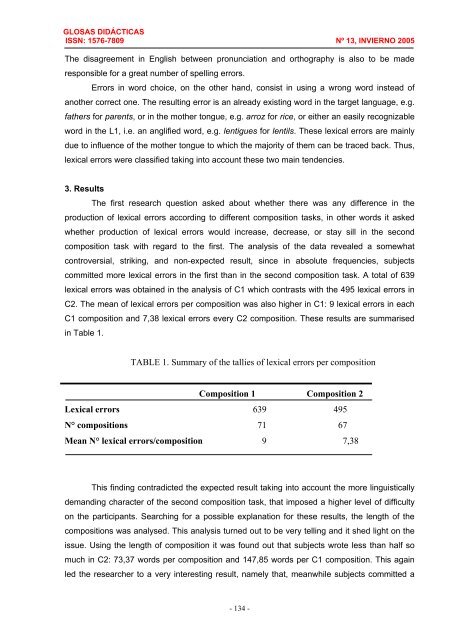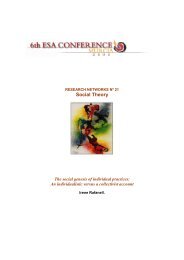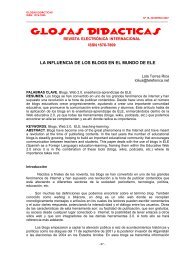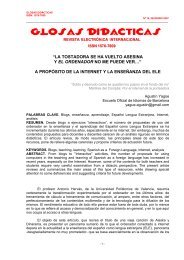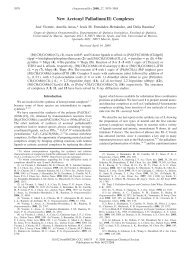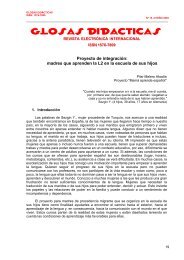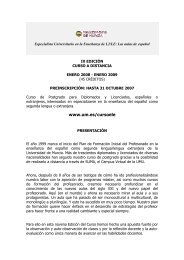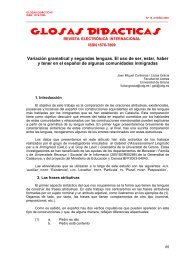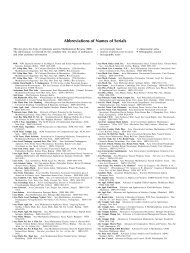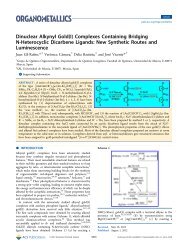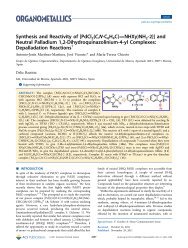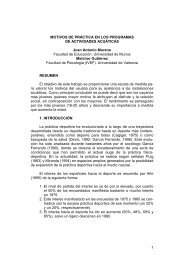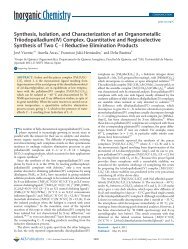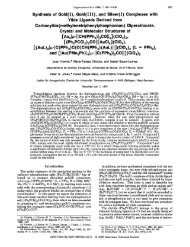descarga del número 13 de glosas didácticas completo
descarga del número 13 de glosas didácticas completo
descarga del número 13 de glosas didácticas completo
You also want an ePaper? Increase the reach of your titles
YUMPU automatically turns print PDFs into web optimized ePapers that Google loves.
GLOSAS DIDÁCTICAS<br />
ISSN: 1576-7809 Nº <strong>13</strong>, INVIERNO 2005<br />
The disagreement in English between pronunciation and orthography is also to be ma<strong>de</strong><br />
responsible for a great number of spelling errors.<br />
Errors in word choice, on the other hand, consist in using a wrong word instead of<br />
another correct one. The resulting error is an already existing word in the target language, e.g.<br />
fathers for parents, or in the mother tongue, e.g. arroz for rice, or either an easily recognizable<br />
word in the L1, i.e. an anglified word, e.g. lentigues for lentils. These lexical errors are mainly<br />
due to influence of the mother tongue to which the majority of them can be traced back. Thus,<br />
lexical errors were classified taking into account these two main ten<strong>de</strong>ncies.<br />
3. Results<br />
The first research question asked about whether there was any difference in the<br />
production of lexical errors according to different composition tasks, in other words it asked<br />
whether production of lexical errors would increase, <strong>de</strong>crease, or stay sill in the second<br />
composition task with regard to the first. The analysis of the data revealed a somewhat<br />
controversial, striking, and non-expected result, since in absolute frequencies, subjects<br />
committed more lexical errors in the first than in the second composition task. A total of 639<br />
lexical errors was obtained in the analysis of C1 which contrasts with the 495 lexical errors in<br />
C2. The mean of lexical errors per composition was also higher in C1: 9 lexical errors in each<br />
C1 composition and 7,38 lexical errors every C2 composition. These results are summarised<br />
in Table 1.<br />
TABLE 1. Summary of the tallies of lexical errors per composition<br />
Composition 1 Composition 2<br />
Lexical errors 639 495<br />
N° compositions 71 67<br />
Mean N° lexical errors/composition 9 7,38<br />
This finding contradicted the expected result taking into account the more linguistically<br />
<strong>de</strong>manding character of the second composition task, that imposed a higher level of difficulty<br />
on the participants. Searching for a possible explanation for these results, the length of the<br />
compositions was analysed. This analysis turned out to be very telling and it shed light on the<br />
issue. Using the length of composition it was found out that subjects wrote less than half so<br />
much in C2: 73,37 words per composition and 147,85 words per C1 composition. This again<br />
led the researcher to a very interesting result, namely that, meanwhile subjects committed a<br />
- <strong>13</strong>4 -


